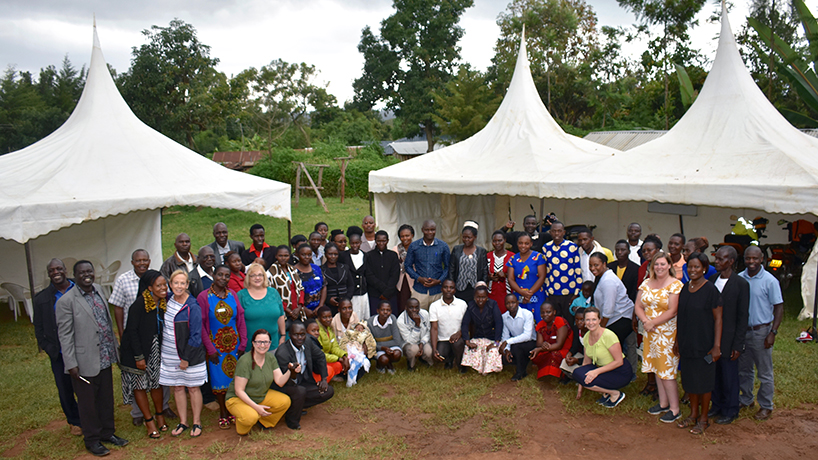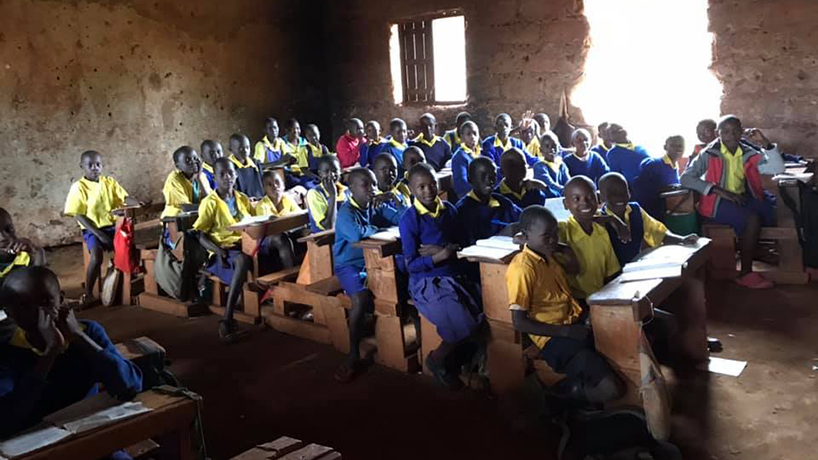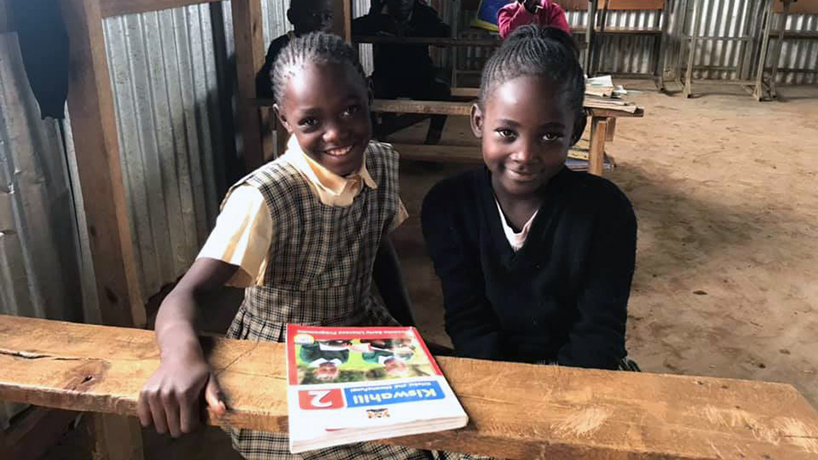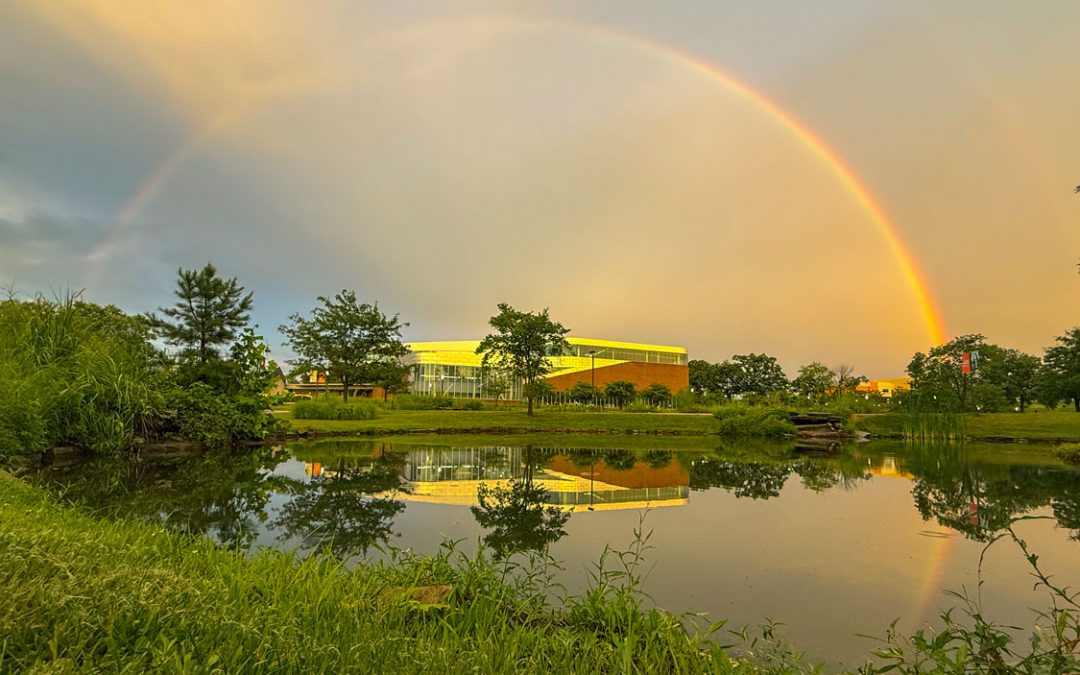
Along with four of her College of Education colleagues, Assistant Professor Shea Kerkhoff led professional development workshops for 60 Kenyan teachers in June. (Submitted photos)
The University of Missouri–St. Louis professors and Kenyan teachers bonded quickly during the Inquiry Initiative Summer Institute.
They had much in common: the struggles of prescribed curricula, set textbooks, the desire to focus on children and their needs first and adapting teaching styles for different environments.
Then there were the communal lunches. They talked about their lives, families, United States schools and the challenges of being a teacher. They became friends over Kenyan food: chapatis, greens and Ugali, a cornmeal mush similar to polenta that’s the national staple food.
Here, however, some differences arose.
“When they found out we didn’t have Ugali in the United States, that blew their minds,” said Shea Kerkhoff, assistant professor in the UMSL College of Education. “One teacher was like, ‘Well, then, I can never come to the United States. I can’t even think about my life if I didn’t have Ugali for a day.’”
In June, Kerkhoff was in Kenya leading three days of teacher training with fellow College of Education instructors Timothy Makubuya, Amber Candela and Lynn Navin. Kerkhoff spearheaded the initiative last year while in graduate school at North Carolina State University. This year, the group taught professional development workshops on digital literacy and student-centered learning.
Everything began with Peter Wanyonyi, who started Faropah orphanage in 2009. He quickly realized it would cost less to start his own school than to send the children to pre-existing ones. He opened Hope Education Center in 2011.
Then, in 2015, he reached out to Going Global, Inc., an organization that supports community benefit projects around the world. The nonprofit sent Kerkhoff, a longtime volunteer, to go scope out the project.
“He was doing these amazing things, and we saw he had strong leadership and good intentions,” Kerkhoff said. “I could see all of the impact that he was making in his community and he how he was giving so much of himself and his resources to others, but there wasn’t anyone who was supporting him.”
Though Wanyonyi’s school staffs only seven teachers, he also serves in a role similar to a school board president for three neighborhood schools. When the local government heard about the trainings, the education official asked Wanyonyi to include all the county’s schools.
This year, 60 Kenyan teachers attended the trainings. Kerkhoff broke them into groups of six to make PowerPoint stories drawn from their personal histories or cultures. At the workshop’s end, the teachers shared their stories with the group.
“Our goal for the professional development is to show teachers strategies that they can implement the next day in their classrooms and, thinking to the future, some strategies that they may be able to implement five years from now because not all the schools have computers,” she said. “Even if they have computers, they may not have electricity every day. If they have computers and electricity, they may not have Wi-Fi. That’s a challenge, and we were cognizant of that.”
By having them develop stories themselves, Kerkhoff modeled student-centered learning – a technique the teachers could begin using immediately. Student-centered learning relies on students exploring, discovering and creating for themselves, which contrasts with the lecture-style teaching commonly used in Kenya.
Last year, she taught inquiry: teaching with open-ended questions. Thanks to some repeat attendees, Kerkhoff heard how readily that had been adopted by the teachers, including one who was using it three times a week in her classroom.
“She had really taken the strategy and was excited about it and was implementing it above and beyond our expectations,” Kerkhoff said. “We also had teachers who said that us being there and coming back and sharing lunch with them every day was very encouraging.
“Some felt encouraged that we were telling them some strategies that they were already doing in their classroom. Some had technology in their classrooms but hadn’t been using it because they didn’t know how. Now they know some ways to get started, so that’s exciting.”
Seeing her work’s cumulative impact, reinforced Kerkhoff’s commitment to continue. Going forward, UMSL will help expand the project by offering a study abroad trip to Kenya in conjunction with NC State.
Students, or interested community members, will shadow teachers in Wanyonyi’s district and plan and run a one-day children’s camp. Next year, UMSL will start offering this study abroad option every other year, alternating with the professional development workshops.
Kerkhoff feels thankful that UMSL and her education colleagues have been so supportive of the initiative, not only with people but financial resources as well.
Along with the external International Literacy Association, Kerkhoff won an UMSL Research Award in conjunction with Navin and Candela won one separately that helped support the trip. The College of Education granted Kerkhoff, Navin and Makubuya a Dean’s Committee Award, and UMSL Global fellowships covered four plane tickets.
That support is a big part of why Kerkhoff chose UMSL.
“When I came to my job interview at UMSL, they were really interested in my work in Kenya,” she said. “A big part of my life that I love is working in Kenya, and the fact that UMSL has been supportive of me continuing not only in my personal life but giving me an opportunity to bring it into my work life is amazing. It makes me feel so happy to be here.”
















